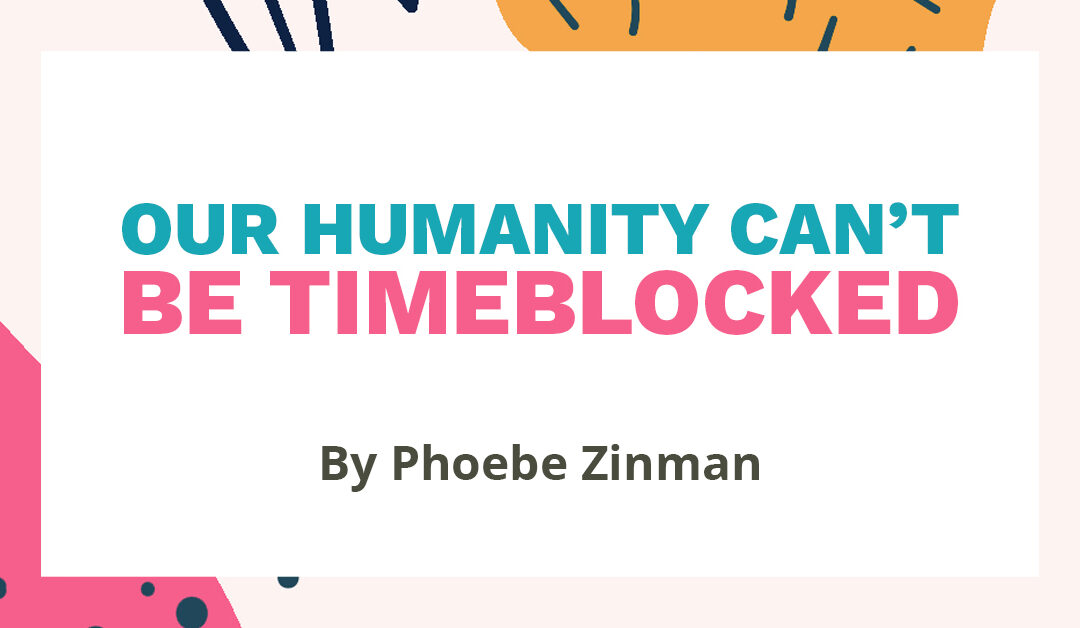By: Phoebe Zinman, Operations and Communications Manager at Kazanas Development Strategies
Nonprofit PTSD is real. But people can be convinced to take a walk or do something with their family. The pleasure of having more time grows on you…
At the end of 2021, the company I work for (Kazanas Development Strategies) completed a massive migration of data, documented our operations process, and provided employees with new hardware. After months of planning and research, we also instituted a 4-day workweek, honor-system paid time off (PTO), and other policies designed to create a sustainable and attractive work environment.
Many companies and organizations have recognized that a 4-day workweek is a great idea but haven’t actually done it yet. When researching the concept, I felt as if there was a dearth of practical, logistical information about how companies can transition. I decided to journal about how the new policies were affecting my workflow and to track what happens when the rubber meets the road.
First of all, let it be known that there are folks for whom the exploitative nonprofit work environment is so ingrained that they would sooner drink decaf than take Friday off completely. Nonprofit PTSD is real. But people can be convinced to take a walk or do something with their family. The pleasure of having more time grows on you (even if it’s never sufficient to do all the things that life requires).
Each week in January, I spent my Mondays and Tuesdays feeling stressed that there was no way for it to all get done, and then had a meltdown on Wednesdays. [In the spirit of transparency, I am prone to a meltdown on Wednesdays.] Then, suddenly, it was Thursday at 5 pm, and everything was done! I grew more confident; I worked hard, I focused, and I filled gaps of time with tasks instead of spinning my wheels or scrolling TikTok. It was feeling good.
But like any good striving white woman in Operations in the nonprofit industrial complex during late-stage capitalism, I thought, this could get even better. This could get even more efficient. I wanted to figure out how to manage time in the best, most perfect way. I wanted color coding and reminders and benchmarks.
My new system worked great, until it didn’t. And despite my passionate embrace of calendar blocking and efficiency, the wheels came off pretty quickly.
1/13/2022
Dear Diary,
It feels bananas that the week is already over and we have a 4-day weekend because Monday is Dr. Martin Luther King, Jr. Day. We got a big snowstorm last Friday so instead of our well-laid plans to enjoy our first Friday off, we were all shoveling or taking kids out in the snow. One of us went to happy hour, everyone else was watching movies or binge-watching Station Eleven (so, so good).
I watched a couple of YouTube videos on calendar blocking and color coding, and it really appeals to my visual- processing mind. Of course, Christina’s calendar is cuter, but she’s been doing this longer. I shared it out on Teams and said we would go over it at the next Professional Development.
1/20/2022
Dear Diary,
On Tuesday, I asked coworkers what they did with their Friday off, but no one responded on Teams. I grudgingly admit that I am the most [only] excited person to document this experiment.
This week already felt short because of the Monday and Friday off but today, Thursday, we’re all juggling kids home from another snow day as well. January is actually a difficult month to try out new things, despite our society assigning “newness” to it; there are holidays and snow days, and holiday recovery, and every week seems a little wonky.
I couldn’t adhere to my calendar blocking AT ALL. Not sure if that’s a reflection of my having ineptly assigned myself tasks at times that aren’t suited to focusing on them, or if it’s because it’s a new system and I’m still used to just ping-ponging from task to task.
Pursuing pleasure is a radical act. Embracing unpredictability is revolutionary.
Fortunately, it didn’t take long to arrive at the realization that all methods for time management are insidiously and inherently ableist and capitalist. This was another discipline that made me feel bad all the time, another system that I couldn’t participate in or see myself represented in because my brain, my home life, and my physical health were uncooperative. And I recognize that I have myriad advantages in being white, femme, and a native English speaker with access to Medicaid. I am able and resourced in so many conventional, visible ways. Additional racial inequities and systemic burdens would likely be insurmountable barriers. I might not have even been able to fill out all the forms.
3/1/2022
Dear Diary,
Timeboxing, calendar blocking, time boxing, time blocking — they all rely on the assumption that one shows up with predictable capacity every day. In the beginning, I thought, “I’ll write in the mornings, and I’ll be more up for Admin tasks on Mondays and Thursdays; Operations and Data feels like a Wednesday thing,” etc…
Here’s what I didn’t take into account: I’m a single mom living in a state where there’s snow, and therefore snow days. I have invisible physical and mental health conditions, and chronic pain. I don’t sleep consistently. In any given week, I’m embroiled in phone tag with insurance companies and doctor’s offices or I need to be at a First Grade Animal Expo, a Fifth Grade Concert, or a library board meeting. Every week, every day, every part of a day can be unpredictable.
Unpredictability is feral, is anti-capitalist, is disabled, and is not color-codable on an Outlook Calendar. In fact, when I tried to calendar block my work week, what became most clear is how good I am at my job in spite of all these challenges because of my considerable personal advantages, and that my skills flourish because professionally I am privileged to work for a company with a culture that nurtures my intuition, playfulness, and an organic workflow.
Anyway, Diary, today I was feeling pretty uncreative and low energy, and I needed to zone out; instead of forcing myself to work on creating content or solving a tricky operations issue, I worked on entering data and scouring our databases. For six hours. Even though it’s Tuesday, and not Wednesday.
So how does one implement a 4-day workweek without fortifying the systems you are trying to disrupt? Nearly all the folks I connected with about adopting a 4-day workweek from other organizations or small consulting companies (many through CCF’s Slack) were interested in figuring out how to actually get everything done by Thursday. How can we be more efficient in those four days?
The response I have developed:
- Focus on being effective, not efficient.
- Benchmark goals for the month, not the week.
- Provide surveys at month’s-end to gauge how the shorter work week impacts stress and deadlines.
- Adopt the most inclusive, progressive, stringent criteria that considers ability, accessibility, and systemic stressors when vetting methods and practices for workflow.
And finally, please remember that time is a construct. Pursuing pleasure is a radical act. Embracing unpredictability is revolutionary.

Phoebe Zinman
Phoebe Zinman (she/her) is a writer and nonprofit professional who has worn almost every nonprofit hat you can think of as an intern, volunteer, teaching artist, service provider, program administrator, event planner, and assistant development director. She worked for years doing social justice and community art-making in Philly, Boston, and NYC at museums, schools, residential facilities, rehabs, universities, and arts councils before moving to advance reproductive justice. Her current position at KDS draws upon all these experiences as she works to create internal change in the nonprofit industry. She lives in New York’s Hudson Valley where she serves on her library board and volunteers for local LGBTQIA+ organizations and county elections. She loves cats and is on hiatus from social media but can be found on LinkedIn.
Discover more from CCF
Subscribe to get the latest posts sent to your email.


My mid-sized organization implemented a 4 day work week in January 2022 and I so appreciate this article as I too have been working towards daily/weekly goals and efficiency instead of measuring how much more effective I have been in my job in that month or quarter.
I now have a bit more work-life balance and use my Fridays for self care, creative projects, or just reset from the week.
Timely piece as my organization just started conversations about 4-day work week. Thank you for sharing!
Shouldn’t we be expected to simply get work accomplished 20% less quickly in a 4 day work week than a 5 day work week? Why should we be expected to cram 20% more into less time? Were we not already working too hard before? I like this post and the point about “effectiveness” over “efficiency” – yes, let good work worth doing take the time it takes even if it goes into next month or next year.